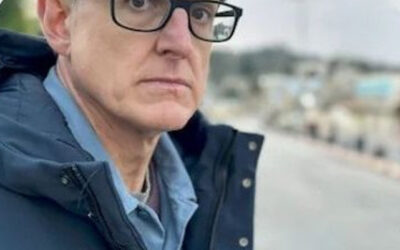My Uncle, Hamas, and How to Disrupt the Terrorists’ Supply Chain

Growing up, my childhood was defined by relentless abuse, physical, emotional, and psychological, inflicted by my uncle. He loomed over my formative years like a storm cloud, his anger a constant, oppressive presence. His punishments were merciless, and his words cut deeper than his actions. On one occasion, he tied me with chains, not for rebellion or misdeed, but for failing to meet his impossible expectations. An A- instead of an A+ was enough to unleash his fury.
In our household, fear was an unspoken language. The mere mention of his name sent chills through my body. My father, though physically present, was paralyzed by fear of my uncle. My mother, instead of shielding me, weaponized the threat of his fury to exert her own control.
My uncle’s rage consumed everything in its path. Furniture was smashed, photo frames shattered, and whatever semblance of peace we had was obliterated. Yet, in his twisted perception, it was all “justified,” “for our own good,” he would say. Despite the pain he caused, I was inexplicably attached to him. When he faced trouble, I defended him. Years later, through therapy, I recognized this for what it was: a form of Stockholm syndrome.
As I grew older, I began to unravel the roots of my uncle’s cruelty. His life was a tapestry of unfulfilled dreams and bitter failures. Unable to achieve his aspirations, he channeled his frustrations into controlling me, imposing unattainable expectations as a way to live vicariously through my successes or to punish me for my perceived failures.
Once, my uncle got into a fight with our neighbors over the borders of the wall separating our properties. He harbored a deep hatred for our neighbor, and this dispute over the wall was merely a pretext for his violent behavior. Even though I knew the truth behind his violence, yet not only did I support him, but I also became actively involved in tearing down the wall and pushing the boundary back several meters to satisfy his demands.
Therapy illuminated a painful truth: the oppressed often become the oppressors. Unhealed trauma perpetuates itself, creating an endless cycle of hurt. Without intervention, I could have easily replicated the patterns of abuse I had endured.
A Collective Stockholm Syndrome
Reflecting on my experience, I see parallels in the relationship between Hamas and the people of Gaza. Hamas treats the people of Gaza not as individuals with rights and aspirations but as instruments to serve a greater ideological cause “For their own good”. Resources meant for humanitarian aid are diverted toward military operations. Infrastructure is neglected in favor of building tunnels and weapons. Lives are sacrificed for the sake of perpetuating a war fueled by hatred. And the people of Gaza are conditioned to act as enablers, protecting and supporting Hamas even as it brings destruction upon them while claiming fighting on their behalf.
At the heart of this dynamic lies Hamas’s ideology: a rigid, hate-filled worldview that prioritizes the annihilation of Israel over the welfare of its own people. This ideology, rooted in Islamic thought, demands complete submission and frames all suffering as a necessary sacrifice for the “greater good.” It is this ideology, rather than genuine concern for land or Palestinian rights, that motivates Hamas’s actions. The people of Gaza are compelled to align themselves with this vision, ensuring that they remain tools in Hamas’s broader agenda.
Scientific research on trauma and oppression provides insight into how such cycles persist. Studies show that prolonged exposure to fear and control conditions individuals to adopt the behaviors and beliefs of their oppressors. This explains why many in Gaza, despite suffering under Hamas’s rule, continue to defend and protect the organization. The oppressed, shaped by years of psychological manipulation, become a ready supply of recruits for Hamas’s cause, perpetuating the cycle of violence and oppression.
Hamas has strategically utilized this conditioning to ensure that the people of Gaza remain a reservoir of loyalty and manpower for its ideological war. Breaking this cycle needs more than addressing the political and humanitarian crises, it demands the dismantling of the ideological and psychological mechanisms that Hamas uses to maintain its control.
Breaking the Cycle
How was I healed? How was I saved from becoming my uncle? It wasn’t an easy or instantaneous process, but three key factors saved me from falling into the same destructive patterns. First, my uncle was removed from my life. Without his constant presence, his oppressive control and influence over me ended, and for the first time, I was no longer living in fear.
Second, I realized the reality of his motivations. He wasn’t truly angry at me. His actions stemmed from a deep hatred of himself, his own failures, and his inability to reconcile with his unrealized dreams. Once I understood this, his power over me diminished. His cruelty wasn’t about me; it was his own internal battle projected outward.
Third, I grew above his influence. I matured emotionally, spiritually, and intellectually. I recognized the patterns of his behavior for what they were. I could critically examine his actions and no longer internalize them or let them define me.
The people of Gaza need a similar process of healing and liberation. First, Hamas must be eradicated and removed from their lives. Its oppressive rule and constant use of fear keep the people in bondage, unable to think freely or see beyond the narrative they are fed. Without the removal of Hamas, the people of Gaza cannot begin to heal.
Second, education is essential. The people need access to unbiased, liberating knowledge that allows them to see the reality of their situation. They need to understand the motivations and manipulations of those who have ruled over them with violence and hatred. Schools like those under UNRWA, operated by Hamas-affiliated educators, can’t bring genuine healing or transformation.
Finally, their ideology must be examined critically. Just as I needed to deconstruct the false beliefs instilled in me by my uncle, the people of Gaza need to critically assess the ideologies that have been used to justify violence and hatred. They must confront the narratives that perpetuate cycles of oppression and violence and replace them with ideologies that promote peace, humanity, and progress.
A few months ago, my uncle experienced a life-altering accident that left him without both his hands. Although I had kept my distance from him for over a decade, as a Christian, I felt an unexpected pull to care for the man who had caused me so much pain. I found myself shedding tears for the very hands that once hurt me. However, this time, I am the one in control. I am determined to ensure that the brokenness he is now experiencing will be a catalyst for healing my family, rather than allowing my family to empower him to regain control.
Today, Hamas is broken, but because the people of Gaza are not healed, Hamas quickly regained power. Hopefully, the next time Hamas is broken, the healed people of Gaza will rise to take control and reshape their future.
![]() About the Author
About the Author

DANNY BURMAWI
Danny Burmawi is an Author, speaker, an advocate for religious liberty, and rational thought, a content creator, and social entrepreneur with a passion for transformative media and advocacy.
Realated Posts
The Hijacking of Modernity: A Cautionary Tale for Europe
The Hijacking of Modernity: A Cautionary Tale for Europe The Arab world wasn’t always veiled in black. Not long ago, cities like Cairo, Damascus, and Baghdad pulsed with modern life. Women wore elegant dresses, walked freely in public, and attended universities...
Why Louis Theroux Got It Wrong
Why Louis Theroux Got It Wrong Louis Theroux’s latest BBC documentary, The Settlers, a follow-up to his 2011 film The Ultra Zionists, has reignited global scrutiny of Israeli settlements in the West Bank. By embedding himself among ultra-nationalist settlers like...
Lebanon: The Forgotten Proof That the Arab-Israeli Conflict Was Never About Land
Lebanon: The Forgotten Proof That the Arab-Israeli Conflict Was Never About Land When Greater Lebanon was established in 1920 under French mandate, its Sunni Muslims population, from Tripoli to Beirut to the southern coast, rejected it immediately. Their objection was...


